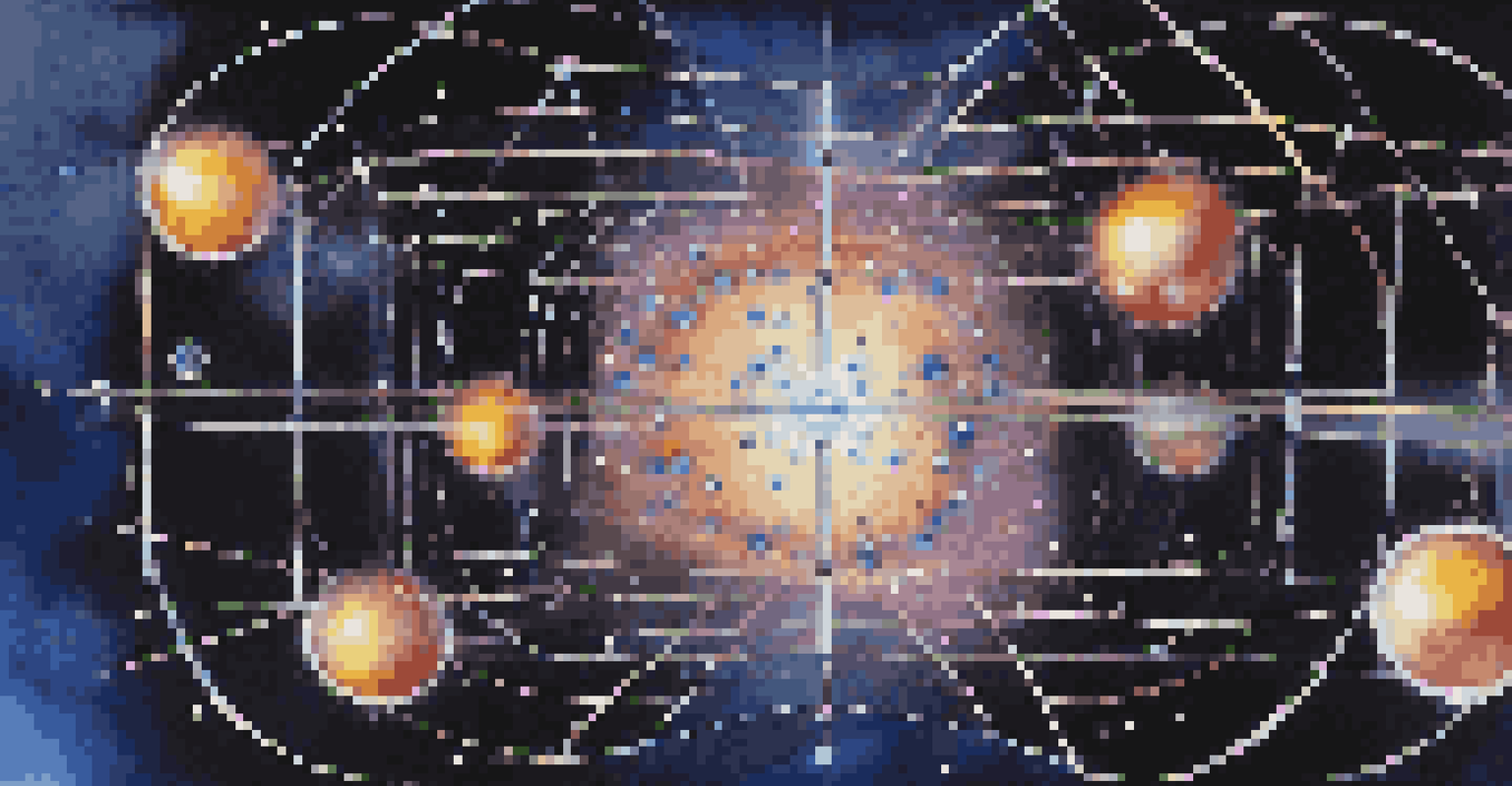Understanding Quantum Computing Hardware: A Technical Overview

What Is Quantum Computing Hardware and Why It Matters
Quantum computing hardware is the physical technology that enables quantum computations, which are fundamentally different from classical computing. Unlike classical bits that are either 0 or 1, quantum bits, or qubits, can exist in multiple states simultaneously, thanks to the principles of superposition and entanglement. This allows quantum computers to solve complex problems much faster than traditional computers, making them a hot topic in the tech world.
Quantum computing is the next revolution in computing, and it's not just about making things faster; it's about solving problems that are currently unsolvable.
Understanding the hardware behind quantum computing is essential because it directly influences the capabilities and performance of quantum systems. As industries from cryptography to pharmaceuticals explore quantum solutions, the demand for efficient and powerful hardware is growing. This makes it crucial to grasp how different components work together to harness the power of quantum mechanics.
In essence, quantum computing hardware is not just a technical curiosity; it's a gateway to potentially revolutionizing how we process information and solve problems. As we delve further into the components and design of quantum systems, we'll better appreciate their potential impact on technology and society.
Key Components of Quantum Computing Hardware
At the heart of quantum computing hardware are qubits, the fundamental units of quantum information. Depending on the technology used, qubits can be realized through various physical systems, such as superconducting circuits, trapped ions, or topological qubits. Each approach has its advantages and challenges, influencing the overall performance and scalability of quantum computers.

Beyond qubits, other essential components include quantum gates, which manipulate qubits to perform calculations, and quantum measurement devices that extract information from qubits. Quantum gates operate similarly to classical logic gates but take advantage of quantum phenomena to enable complex operations. This interplay between qubits and gates is what allows quantum algorithms to run efficiently.
Qubits: The Heart of Quantum Tech
Qubits are the fundamental units of quantum information, enabling quantum computers to solve complex problems more efficiently than classical systems.
Additionally, supporting systems like cryogenic cooling or vacuum chambers are often necessary to maintain the delicate conditions required for qubits to function properly. These components work together in a highly coordinated manner, making the design and construction of quantum hardware a complex but fascinating undertaking.
Superconducting Qubits: The Leading Technology
Superconducting qubits are one of the most widely researched and utilized types of qubits in quantum computing hardware today. They operate at extremely low temperatures, utilizing superconductivity to create qubit states that can be manipulated with microwave pulses. This technology has gained significant traction due to its relative ease of integration with existing semiconductor fabrication methods.
The future of computing is not just about classical or quantum systems; it's about how we can integrate both to create more powerful solutions.
One of the key advantages of superconducting qubits is their fast operation speed, which allows for rapid qubit manipulation and measurement. However, they also face challenges, such as short coherence times, which limit their ability to maintain information over extended periods. Researchers are continuously working to improve these aspects to enhance the overall performance of superconducting quantum computers.
As major tech companies and research institutions invest in superconducting qubit technology, we've seen rapid advancements in quantum computing capabilities. The ongoing innovations in this space suggest that superconducting qubits may play a critical role in the near-term practical applications of quantum computing.
Trapped Ion Qubits: Precision and Stability
Trapped ion qubits represent another promising approach to quantum computing hardware, offering remarkable precision and stability. In this technology, individual ions are trapped using electromagnetic fields and manipulated using lasers to perform quantum operations. The inherent stability of trapped ions allows for longer coherence times compared to some other qubit types.
One of the significant benefits of trapped ion systems is their ability to implement high-fidelity quantum gates, enabling accurate error correction. This feature is crucial for building reliable quantum computers, as errors can easily accumulate during computations. However, trapped ion systems can be slower in operation due to the complexities involved in laser manipulation.
Error Correction Boosts Reliability
Quantum error correction is crucial for maintaining the integrity of quantum information, allowing for reliable computation despite qubit errors.
As research progresses, the combination of stability and precision in trapped ion qubits is paving the way for scalable quantum computing solutions. While challenges remain, advancements in this technology could lead to significant breakthroughs in quantum algorithms and applications.
Topological Qubits: The Future of Quantum Hardware?
Topological qubits are an exciting area of research within quantum computing hardware, promising to offer robust qubits that are less susceptible to errors. These qubits are based on exotic particles known as anyons, which exhibit non-abelian statistics, allowing them to encode information in a topological manner. This unique property provides inherent protection against certain types of decoherence, making them potentially more stable than other qubit implementations.
Although still largely in the experimental stage, topological qubits have the potential to revolutionize how we approach quantum computing. Their resilience against environmental disturbances could lead to scalable and fault-tolerant quantum systems, a major goal in the field. However, realizing practical topological qubits requires further research and technological advancements.
As scientists continue to explore the possibilities of topological qubits, this area of research holds great promise for the future of quantum computing. The potential for creating durable and efficient quantum hardware could significantly impact various fields, from cryptography to complex system modeling.
Quantum Error Correction: Ensuring Reliable Computation
Quantum error correction is a vital aspect of quantum computing hardware, addressing the challenge of qubit errors that can arise during computations. Due to the fragile nature of qubits and their susceptibility to environmental noise, implementing effective error correction techniques is crucial for maintaining the integrity of quantum information. This process involves encoding logical qubits into multiple physical qubits to protect against errors.
There are various error correction codes designed specifically for quantum systems, such as the Shor code and the Steane code, which help to detect and correct errors without measuring the qubits directly. This ability to preserve quantum information is essential for executing complex algorithms in a fault-tolerant manner. However, the overhead introduced by error correction can also complicate the hardware design.
Future: Hybrid Quantum-Classical Systems
The convergence of quantum and classical computing holds the potential to unlock new computational paradigms and applications across various industries.
As researchers continue to develop more efficient quantum error correction methods, the goal is to enable practical and reliable quantum computing. With effective error correction, we can unlock the full potential of quantum algorithms, paving the way for transformative applications across multiple industries.
The Role of Classical Control Systems in Quantum Hardware
While quantum computing hardware relies heavily on quantum mechanics, classical control systems play a crucial role in managing and operating quantum devices. These classical systems are responsible for generating control pulses, measuring qubit states, and performing error correction, all of which require precise timing and coordination. The interplay between classical and quantum components is essential for the successful execution of quantum algorithms.
Classical control systems often utilize advanced electronics, such as FPGA (Field-Programmable Gate Array) technology, to achieve the necessary speed and flexibility in controlling qubits. This integration allows for real-time adjustments and optimizations, ensuring that the quantum hardware operates at peak efficiency. As quantum technologies advance, so too will the sophistication of the classical systems that support them.

Ultimately, understanding the symbiotic relationship between classical and quantum systems is vital for anyone interested in quantum computing hardware. This harmony is what enables the realization of complex quantum computations, bridging the gap between theoretical possibilities and practical applications.
The Future of Quantum Computing Hardware
The future of quantum computing hardware is both exciting and uncertain, with ongoing research driving rapid advancements in the field. As various qubit technologies develop, we can expect to see improvements in coherence times, error rates, and scalability. These enhancements will be pivotal in making quantum computing a practical reality for solving real-world problems across industries.
Moreover, the convergence of quantum and classical computing is likely to play a significant role in shaping the future landscape of technology. Hybrid systems that leverage both quantum and classical capabilities could unlock new computational paradigms, further expanding the potential applications of quantum computing. This synergy may lead to breakthroughs in areas like artificial intelligence, optimization, and materials science.
As we look ahead, the progress in quantum computing hardware will undoubtedly continue to captivate researchers, technologists, and industries alike. By staying attuned to these developments, we can better prepare for a future where quantum computing becomes an integral part of our technological ecosystem.